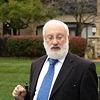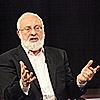Audio Version Of The Blog – 6/13/22
Listen to an Audio Version of the Blog
Download:MP3 Audio

Listen to an Audio Version of the Blog
Download:MP3 Audio
 Question: What is the difference between group prayer and individual prayer?
Question: What is the difference between group prayer and individual prayer?
Answer: There is neither group nor individual prayer. A person always prays through others, for others. There is no other prayer.
Prayer only for oneself does not give anything, it is just a voice crying in the desert.
Comment: But a person usually prays for himself.
My Response: There is nothing to even say about it. People who come to us do so at first. But they are new comers and the light takes this into account. Then the light gradually brings a person to a state where he feels that all his prayers should be for connection, through connection, only in connection, in order to lose himself in global unity.
[298568]
From KabTV’s “I Got a Call. How to Pray” 10/20/09
Related Material:
To Pray Means to Judge Yourself
A Prayer By The Central Pillar
The Importance Of Prayer
 Ancient Judea is a kingdom that existed for eight hundred years.
Ancient Judea is a kingdom that existed for eight hundred years.
What is left of it? Nothing! During the excavations, only prayer houses were found, the places where people gathered, and nothing more. Where are all the huge buildings, architectural monuments, and writings of a culture?!
Whereas in ancient Greece there is a lot to see! Ancient stadiums where the Olympics were held, Mount Olympus. Although it seems that this mountain is just seven to eight hundred meters high, these are all stones, but they remain.
In Rome too. Despite the fall, the Colosseum, the arch, the Roman gates, and so on, remained. It is so in many places in the world. There is nothing there! Because there was nothing.
Nothing like this was built in Judea, except for the Temple. The Temple also was such that there was nothing to see. A very small space: a courtyard for men, a courtyard for women, a courtyard for the nations of the world, a few interior rooms, and that was it. The plan of the Temple has been preserved.
There is even a plan for the future Third Temple. But actually, it must be built spiritually, therefore its earthly architecture is also known.
[298473]
From KabTV’s “I Got a Call. Features of Judaism” 5/22/14
Related Material:
A Temple That Is Built In The Heart
Creating A Model Of The Upper World In Me
Reading Is Revelation
 Question: Is pleasure a kind of spiritual substance?
Question: Is pleasure a kind of spiritual substance?
Answer: Pleasure is the filling by the upper energy.
Even in our world, it comes to us from above. The life that spins atoms, holds molecules, and all the chemical and biological transformations that fill and spiritualize us—all this is called light in Kabbalah.
Question: The light that Kabbalah talks about and Ari writes about at the very beginning of his book The Tree of Life, and the light that Einstein talks about as a kind of substance in his theory of relativity—are these unambiguous concepts?
Answer: In our world also, light is the foundation of life. But this is a consequence of spiritual light in the material world because our world is built as an imprint of the upper world.
Light is the highest spiritual energy from which a small spark broke into our world, into our empty universe, and gave birth to everything that exists in it today—everything that we know and do not yet know.
[298538]
From KabTV’s “Close-Up. Does God Exist?”
Related Material:
Light Is When It Is Light Within
What Is the Upper Light?
The Light That Reforms
 Question: Where does the force of life come from?
Question: Where does the force of life come from?
Answer: There are two forces in nature: the force of bestowal and love and opposite to it the force of reception, absorption, and consumption.
All parts of nature are built only with the force of consumption for themselves, for their own sake, depending on the size of desire. There are objects with a great desire. They consume more, bring that which they desire more closely to themselves and push the harmful out of themselves more strongly. Useful or harmful, this is how the force of desire in each object of nature is determined.
Therefore, if we see inanimate objects whose desire is very small; their entire concern is only to keep themselves in a certain state so that crystal lattices or molecules hold together.
If there is a bigger desire in an object, then it develops other forms of life in itself; it does not just preserve its structure, but wants to attract useful things to itself and push out harmful ones. It becomes a plant, which consumes and emits.
If the desire is even bigger, then this object acquires an animal form. It already can move to find the best opportunities to consume and get rid of something for itself. It has the ability to give birth, that is, to develop itself in the next forms.
The biggest desire in objects is the human. It not only has the ability to consume and emit like a plant, move and give birth like an animal, but feels himself relative to the past, the future, and relative to others.
He develops envy, pride, and the desire for power and fame. Moreover, he compares himself with all previous generations, and this develops his desire. We see that as soon as a person is born, he immediately begins to develop.
He looks at others and with the help of envy, jealousy, and pride absorbs their desires from them. Therefore, his egoism develops all the time. An animal develops to a certain limit and that’s it. It is engaged only in providing itself with shelter and offspring, and nothing else.
Meaning, an animal acts on the basis of the instincts of a developing, but constant desire. In humans, however, this desire develops infinitely due to the environment, which bothers him all the time.
[298366]
From KabTV’s “Close-Up. Does the Creator exist?” 5/9/11
Related Material:
Evolution Of Desires, Part 1
The Evolution Of Desires
Still, Vegetative, Animate And Speaking
 Question: How does a Kabbalist relate to the world?
Question: How does a Kabbalist relate to the world?
Answer: Like a caring mother hen.
Question: You said that the most sensitive and the most developed receive more blows. Therefore throughout history have we seen that Kabbalists have been persecuted and suffered various blows?
Answer: Yes, it is so. But blows were also sent to them in order to force them to develop faster. There is no escape, development in the main part of history was still going under the influence of suffering.
And only in our time do we begin to enter a period of conscious development, when we can understand why suffering is given, where it comes from, and how we can go on with it. Therefore, when we act consciously instead of suffering, which pushes us, we begin to draw ourselves to a good future.
[298628]
From KabTV’s “Close-Up. Branch of Sakura” 5/15/11
Related Material:
The Kabbalists About The Nation Of Israel And The Nations Of The World, Part 15
A Kabbalist And The World
Zionism and Kabbalah
 Comment: We are all egoists. But the egoism of some is made such that they frankly rejoice if someone else gets blows.
Comment: We are all egoists. But the egoism of some is made such that they frankly rejoice if someone else gets blows.
My Response: Such is our egoism! No one is to blame for this. But to admit to oneself that one is like this must be very painful for a person. But deep down, we absolutely do not care what happens a millimeter away from us with someone else. And even if he’s worse, I feel better. This is our egoism.
When such events occur and I feel that egoism is aroused in me, I must understand that this is evil in me and I would like to somehow get rid of it, to correct it.
And you should not rejoice in the troubles of others. People do not understand that they are only harming themselves with this.
[298621]
From KabTV’s “Close-Up. Branch of Sakura” 5/15/11
Related Material:
The Unruly Nature Of Egoism
Egoism Is The Driving Force
Egoism Poisons Our Lives
 Michael Laitman, On Quora: “Why does God exist or not exist?“
Michael Laitman, On Quora: “Why does God exist or not exist?“
God does not exist. What exists is nature with its eternal laws. In the wisdom of Kabbalah, the primary fundamental force of nature is called “the Creator,” because nature creates all life, including us.
We exist in nature as its parts. While it seems as if we can observe and make decisions about nature from outside of it, we cannot. We are nature’s creations, and our uniqueness is in our ability to bring about certain changes out of our free will.
In general, we are in nature, and nature is a whole system and creation that is sustained by a single force called “the Creator.”

Based on KabTV’s “Close-Up. Does God Exist?” with Kabbalist Dr. Michael Laitman. Written/edited by students of Kabbalist Dr. Michael Laitman on May 9, 2011.
Photo by Mohamed Nohassi on Unsplash
Preparation to the Lesson
| [media 1] | [media 2] |
Writings of Rabash, Article 9 “A Hedge for Wisdom – Silence 1”
| [media 3] | [media 4] |
Writings of Baal HaSulam, “The Freedom”
| [media 5] | [media 6] |
Writings of Baal HaSulam, “Study of the Ten Sefirot, Vol. 1, Part 3,” Chapter 1, Item 1
| [media 7] | [media 8] |
Selected Highlights
| [media 9] | [media 10] |